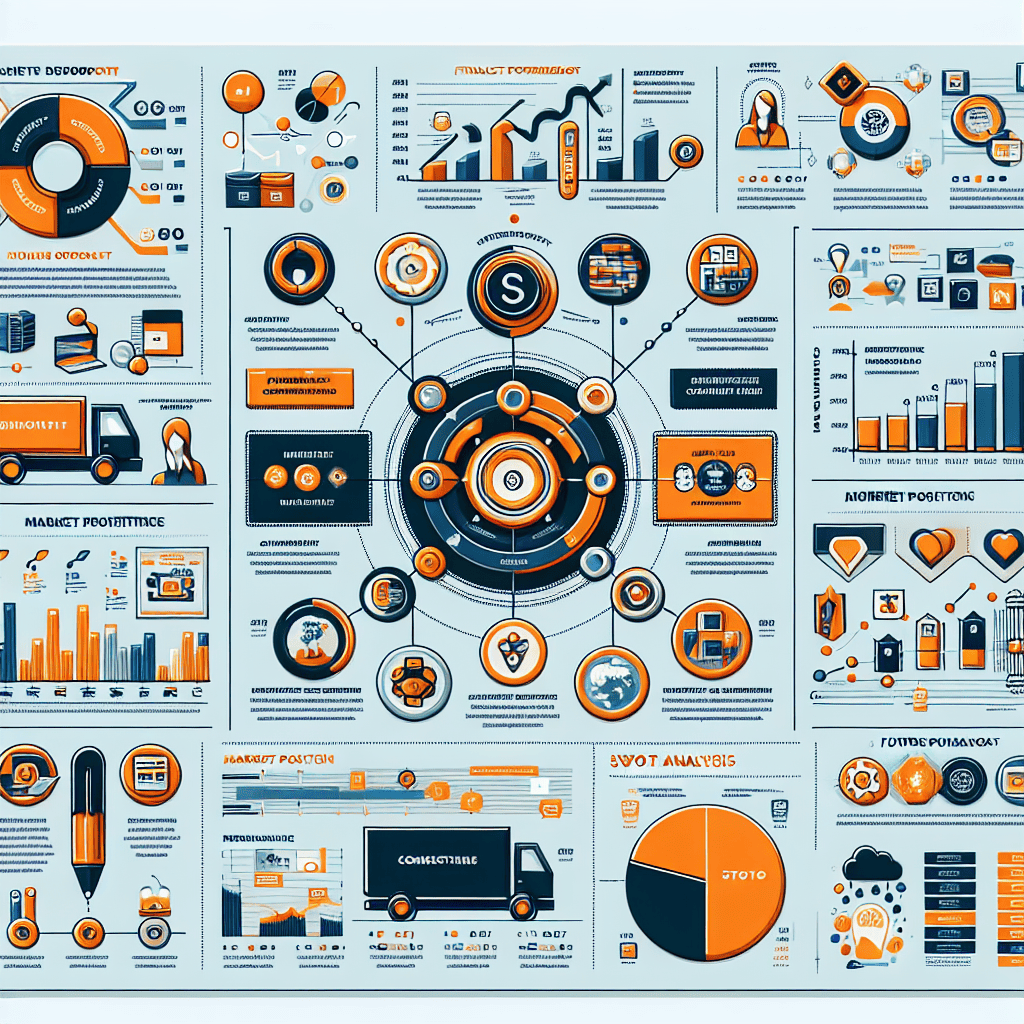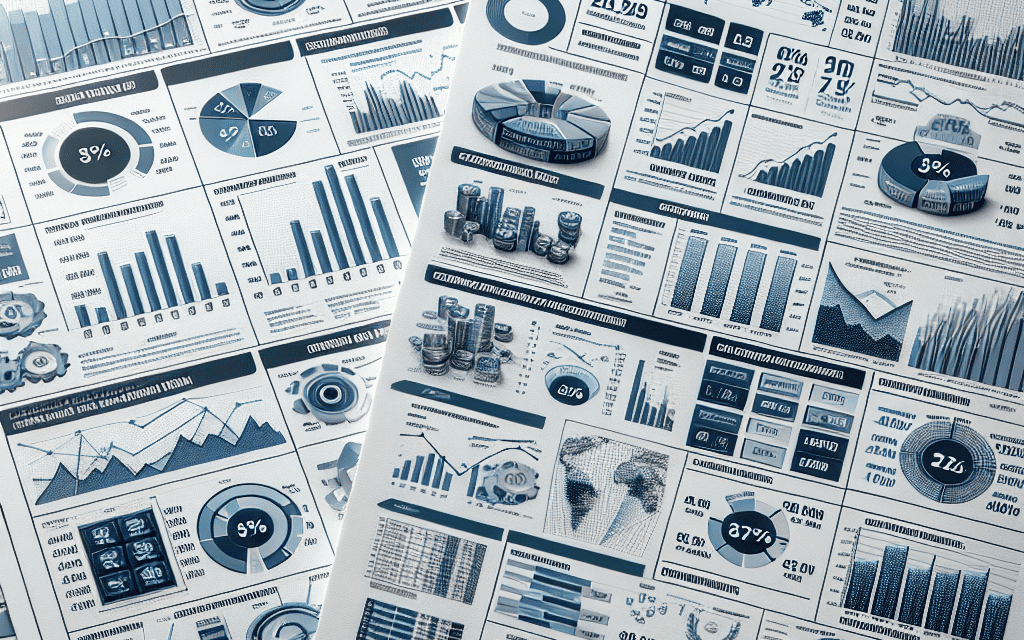“Unilever PLC: Navigating Market Dynamics with Strategic Precision”
Introduction
Unilever PLC: Analyst Insights Report
Unilever PLC, a leading multinational corporation, is renowned for its diverse portfolio of consumer goods, spanning categories such as food and beverages, cleaning agents, beauty, and personal care products. Headquartered in London, United Kingdom, and Rotterdam, Netherlands, Unilever operates in over 190 countries, reaching billions of consumers worldwide. The company’s extensive brand portfolio includes household names like Dove, Knorr, Lipton, and Ben & Jerry’s, which have become staples in homes globally. Unilever’s strategic focus on sustainable growth, innovation, and market expansion has positioned it as a formidable player in the fast-moving consumer goods (FMCG) sector. This report delves into Unilever’s financial performance, market strategies, competitive positioning, and future growth prospects, providing a comprehensive analysis for investors and stakeholders seeking to understand the company’s trajectory in an ever-evolving global market.
Unilever’s Strategic Initiatives: A Deep Dive
Unilever PLC, a global leader in consumer goods, has consistently demonstrated its ability to adapt and thrive in an ever-evolving market landscape. As the company navigates the complexities of the 21st century, its strategic initiatives have become a focal point for analysts seeking to understand its sustained success. At the heart of Unilever’s strategy is a commitment to sustainability, innovation, and market expansion, which collectively drive its long-term growth and resilience.
To begin with, Unilever’s sustainability initiatives are a cornerstone of its corporate strategy. The company has long recognized the importance of integrating environmental and social considerations into its business model. This commitment is exemplified by the Unilever Sustainable Living Plan, which aims to decouple the company’s growth from its environmental footprint while increasing its positive social impact. By setting ambitious targets, such as reducing greenhouse gas emissions and improving water efficiency, Unilever not only addresses pressing global challenges but also enhances its brand reputation and consumer trust. Furthermore, these efforts align with the growing consumer demand for sustainable products, positioning Unilever as a leader in the industry.
In addition to sustainability, innovation plays a critical role in Unilever’s strategic framework. The company invests heavily in research and development to create products that meet the evolving needs of consumers. By leveraging cutting-edge technology and data analytics, Unilever is able to anticipate market trends and deliver innovative solutions that resonate with its diverse customer base. For instance, the company’s focus on digital transformation has enabled it to enhance its supply chain efficiency and improve customer engagement through personalized marketing strategies. This emphasis on innovation not only drives product differentiation but also fosters a culture of continuous improvement within the organization.
Moreover, Unilever’s strategic initiatives extend to market expansion, particularly in emerging economies. Recognizing the potential for growth in these regions, the company has strategically invested in local production facilities and distribution networks to strengthen its presence. By tailoring its product offerings to meet local preferences and price points, Unilever effectively captures market share and builds brand loyalty. Additionally, the company’s commitment to empowering local communities through job creation and skills development further solidifies its position as a trusted partner in these markets. This approach not only contributes to Unilever’s revenue growth but also supports its broader mission of making sustainable living commonplace.
Transitioning to another key aspect of Unilever’s strategy, the company places a strong emphasis on strategic partnerships and acquisitions. By collaborating with other industry leaders and acquiring complementary businesses, Unilever enhances its product portfolio and expands its market reach. These strategic moves enable the company to tap into new consumer segments and leverage synergies that drive operational efficiencies. For example, Unilever’s acquisition of eco-friendly brands aligns with its sustainability goals while also appealing to environmentally conscious consumers. Such strategic decisions underscore the company’s proactive approach to staying ahead of industry trends and maintaining its competitive edge.
In conclusion, Unilever’s strategic initiatives are a testament to its ability to navigate the complexities of the global market while remaining true to its core values. Through a focus on sustainability, innovation, market expansion, and strategic partnerships, the company continues to deliver value to its stakeholders and drive long-term growth. As analysts continue to monitor Unilever’s progress, it is clear that the company’s strategic vision and execution will play a pivotal role in shaping its future success.
Financial Performance Analysis of Unilever PLC
Unilever PLC, a global leader in consumer goods, has consistently demonstrated robust financial performance, reflecting its strategic agility and operational efficiency. As we delve into the financial performance analysis of Unilever PLC, it is essential to consider the company’s revenue streams, profitability, and market positioning, which collectively underscore its resilience in a competitive landscape. Over recent years, Unilever has adeptly navigated economic fluctuations and market dynamics, leveraging its diverse portfolio of brands to sustain growth and profitability.
To begin with, Unilever’s revenue generation is anchored in its extensive range of products spanning food, beverages, cleaning agents, and personal care items. This diversification not only mitigates risks associated with market volatility but also positions the company to capitalize on emerging consumer trends. In recent financial reports, Unilever has consistently reported steady revenue growth, driven by both organic growth and strategic acquisitions. The company’s ability to adapt to changing consumer preferences, such as the increasing demand for sustainable and health-conscious products, has been pivotal in maintaining its revenue trajectory.
Moreover, Unilever’s profitability is a testament to its operational efficiency and cost management strategies. The company has implemented various initiatives aimed at optimizing its supply chain and reducing operational costs, thereby enhancing its profit margins. For instance, Unilever’s focus on digital transformation and automation has streamlined its manufacturing processes, resulting in significant cost savings. Additionally, the company’s commitment to sustainability has not only bolstered its brand image but also contributed to cost efficiencies through reduced resource consumption and waste.
Transitioning to market positioning, Unilever’s global footprint and strong brand equity are critical components of its financial success. The company’s presence in over 190 countries provides a broad market base, enabling it to tap into diverse consumer segments. Unilever’s strategic investments in emerging markets have been particularly noteworthy, as these regions offer substantial growth opportunities due to rising disposable incomes and changing consumer lifestyles. By tailoring its product offerings to meet local preferences and investing in localized marketing strategies, Unilever has effectively strengthened its market position.
Furthermore, Unilever’s financial performance is bolstered by its commitment to innovation and research and development. The company continually invests in developing new products and enhancing existing ones to meet evolving consumer needs. This focus on innovation not only drives revenue growth but also reinforces Unilever’s competitive edge in the market. The company’s ability to introduce successful new products and adapt to technological advancements is a key factor in sustaining its financial performance.
In addition to these factors, Unilever’s strategic acquisitions and partnerships have played a significant role in its financial performance. By acquiring complementary businesses and forming strategic alliances, Unilever has expanded its product portfolio and market reach. These strategic moves have not only contributed to revenue growth but also enhanced the company’s capabilities and resources.
In conclusion, Unilever PLC’s financial performance is characterized by its strong revenue growth, profitability, and strategic market positioning. The company’s ability to adapt to market changes, optimize operations, and invest in innovation and strategic partnerships underscores its resilience and growth potential. As Unilever continues to navigate the complexities of the global market, its financial strategies and performance will remain a focal point for analysts and investors alike, reflecting its enduring strength in the consumer goods industry.
Unilever’s Sustainability and Environmental Goals
Unilever PLC, a global leader in consumer goods, has long been recognized for its commitment to sustainability and environmental stewardship. As the company continues to navigate the complexities of the modern marketplace, its sustainability and environmental goals remain at the forefront of its strategic initiatives. This focus not only aligns with global trends towards more sustainable business practices but also positions Unilever as a pioneer in integrating environmental considerations into its core operations.
To begin with, Unilever’s sustainability strategy is deeply embedded in its business model, reflecting a comprehensive approach that encompasses the entire value chain. The company has set ambitious targets to reduce its environmental footprint, aiming to halve the environmental impact of its products by 2030. This goal is part of the broader Unilever Sustainable Living Plan, which outlines specific objectives across various domains, including greenhouse gas emissions, water usage, and waste management. By setting such targets, Unilever demonstrates a proactive stance in addressing environmental challenges, thereby reinforcing its commitment to sustainable development.
Moreover, Unilever’s efforts to achieve these goals are supported by innovative practices and technologies. For instance, the company has invested significantly in renewable energy sources, with a target to achieve 100% renewable energy across its operations. This transition not only reduces carbon emissions but also enhances energy efficiency, contributing to a more sustainable production process. Additionally, Unilever has implemented water stewardship programs aimed at reducing water consumption and improving water quality in its supply chain. These initiatives are particularly crucial in regions facing water scarcity, where sustainable water management can have a profound impact on local communities and ecosystems.
In addition to operational improvements, Unilever places a strong emphasis on sustainable sourcing. The company is committed to sourcing all of its agricultural raw materials sustainably, a goal that underscores its dedication to preserving biodiversity and supporting sustainable agriculture. By working closely with suppliers and farmers, Unilever ensures that its supply chain adheres to rigorous environmental and social standards. This collaborative approach not only enhances the sustainability of its products but also fosters resilience and transparency within the supply chain.
Furthermore, Unilever’s commitment to sustainability extends to its product portfolio, where it seeks to develop products that are both environmentally friendly and socially responsible. The company has made significant strides in reducing plastic waste, with a pledge to make all of its plastic packaging recyclable, reusable, or compostable by 2025. This initiative is part of a broader effort to transition towards a circular economy, where resources are used more efficiently and waste is minimized. By prioritizing sustainable packaging solutions, Unilever not only addresses consumer demand for eco-friendly products but also contributes to global efforts to combat plastic pollution.
In conclusion, Unilever’s sustainability and environmental goals are integral to its business strategy, reflecting a holistic approach that encompasses innovation, collaboration, and accountability. As the company continues to advance its sustainability agenda, it sets a benchmark for the industry, demonstrating that environmental responsibility and business success can go hand in hand. Through its unwavering commitment to sustainability, Unilever not only enhances its competitive edge but also contributes to a more sustainable future for all.
Market Position and Competitive Landscape of Unilever

Unilever PLC, a global leader in the fast-moving consumer goods (FMCG) sector, has consistently maintained a robust market position through its diverse portfolio of brands and strategic market initiatives. As one of the largest consumer goods companies worldwide, Unilever’s market position is bolstered by its extensive reach across various product categories, including food and beverages, home care, and personal care. This diversification not only mitigates risks associated with market fluctuations but also allows the company to capitalize on emerging consumer trends.
In the competitive landscape, Unilever faces formidable rivals such as Procter & Gamble, Nestlé, and Colgate-Palmolive. Despite this intense competition, Unilever has managed to carve out a significant share of the market through its strong brand equity and innovative product offerings. The company’s ability to adapt to changing consumer preferences, particularly the growing demand for sustainable and ethically sourced products, has further strengthened its competitive edge. By integrating sustainability into its core business strategy, Unilever has not only enhanced its brand image but also attracted a loyal customer base that values corporate responsibility.
Moreover, Unilever’s strategic acquisitions and partnerships have played a crucial role in reinforcing its market position. By acquiring brands that align with its sustainability goals and expanding its presence in high-growth markets, Unilever has effectively broadened its consumer base and increased its market penetration. For instance, the acquisition of Seventh Generation, a company known for its eco-friendly products, has allowed Unilever to tap into the growing market for green consumer goods. Such strategic moves have enabled Unilever to stay ahead of the curve and maintain its competitive advantage.
In addition to its strategic acquisitions, Unilever’s investment in research and development (R&D) has been instrumental in driving innovation and maintaining its market leadership. By focusing on product innovation and improving operational efficiencies, Unilever has been able to introduce new products that meet the evolving needs of consumers. This commitment to innovation is evident in the company’s efforts to develop products that cater to health-conscious consumers, such as low-sugar and plant-based food options. As a result, Unilever has been able to capture a significant share of the health and wellness market, further solidifying its market position.
Furthermore, Unilever’s global distribution network and strong supply chain capabilities have been key factors in its success. The company’s ability to efficiently manage its supply chain and ensure product availability across various markets has been critical in maintaining its competitive edge. By leveraging its extensive distribution network, Unilever can quickly respond to market demands and deliver products to consumers in a timely manner. This operational efficiency not only enhances customer satisfaction but also strengthens Unilever’s market position.
In conclusion, Unilever PLC’s market position and competitive landscape are shaped by its diverse product portfolio, strategic acquisitions, commitment to sustainability, and focus on innovation. By continuously adapting to changing consumer preferences and leveraging its global reach, Unilever has managed to maintain its leadership in the FMCG sector. As the company continues to navigate the challenges and opportunities in the market, its strategic initiatives and strong brand equity will likely ensure its continued success and growth in the years to come.
Innovations and Product Development at Unilever
Unilever PLC, a global leader in consumer goods, has consistently demonstrated a commitment to innovation and product development, which remains a cornerstone of its strategic growth. As the company navigates the complexities of a rapidly evolving market, it continues to leverage its robust research and development capabilities to meet changing consumer preferences and address global challenges. This focus on innovation is not only pivotal for maintaining competitive advantage but also for driving sustainable growth in an increasingly conscious consumer landscape.
One of the key areas where Unilever has made significant strides is in the development of sustainable products. Recognizing the growing consumer demand for environmentally friendly options, Unilever has prioritized the integration of sustainability into its product development processes. This commitment is evident in its ambitious Sustainable Living Plan, which aims to decouple the company’s growth from its environmental footprint while increasing its positive social impact. By investing in sustainable sourcing and production methods, Unilever is not only reducing its environmental impact but also enhancing the appeal of its brands to eco-conscious consumers.
Moreover, Unilever’s innovation strategy is deeply intertwined with its digital transformation efforts. The company has embraced digital tools and technologies to enhance its product development processes, from leveraging data analytics to understand consumer trends to utilizing artificial intelligence for product formulation. This digital-first approach enables Unilever to respond swiftly to market changes and consumer needs, ensuring that its product offerings remain relevant and competitive. By harnessing the power of digital innovation, Unilever is able to streamline its operations, reduce time-to-market, and improve the overall consumer experience.
In addition to sustainability and digital transformation, Unilever is also focusing on health and wellness as a key driver of product innovation. With consumers increasingly prioritizing health and well-being, Unilever has expanded its portfolio to include products that cater to this growing demand. The company has introduced a range of health-focused products, from plant-based foods to personal care items with enhanced health benefits. This strategic focus not only aligns with consumer trends but also positions Unilever as a leader in the health and wellness space, further strengthening its market position.
Furthermore, Unilever’s commitment to innovation is reflected in its collaborative approach to product development. The company actively seeks partnerships with startups, research institutions, and other industry players to foster innovation and bring new ideas to market. By collaborating with external partners, Unilever is able to tap into a diverse pool of expertise and resources, accelerating the development of innovative solutions that address complex consumer needs. This collaborative model not only enhances Unilever’s innovation capabilities but also fosters a culture of creativity and experimentation within the organization.
In conclusion, Unilever PLC’s focus on innovation and product development is a testament to its commitment to staying ahead in a dynamic market environment. By prioritizing sustainability, embracing digital transformation, and addressing health and wellness trends, Unilever is well-positioned to meet the evolving needs of consumers while driving sustainable growth. Through strategic collaborations and a forward-thinking approach, the company continues to reinforce its reputation as a leader in the consumer goods industry, setting a benchmark for innovation and excellence. As Unilever navigates the future, its dedication to innovation will undoubtedly remain a key driver of its success.
Unilever’s Global Expansion and Growth Strategies
Unilever PLC, a leading multinational corporation, has long been recognized for its robust portfolio of consumer goods, ranging from food and beverages to personal care and cleaning products. As the company continues to expand its global footprint, understanding its growth strategies becomes essential for analysts and investors alike. Unilever’s approach to global expansion is multifaceted, involving strategic acquisitions, innovation in product development, and a strong commitment to sustainability. These elements collectively contribute to its sustained growth and competitive edge in the global market.
One of the key strategies Unilever employs in its global expansion is strategic acquisitions. By acquiring companies that complement its existing product lines, Unilever not only broadens its portfolio but also gains access to new markets and consumer bases. For instance, the acquisition of Dollar Shave Club in 2016 allowed Unilever to penetrate the male grooming market more effectively, leveraging the subscription-based model that had gained significant traction. Similarly, the purchase of Seventh Generation, a company known for its eco-friendly cleaning products, aligned with Unilever’s sustainability goals while expanding its reach in the environmentally conscious consumer segment.
In addition to acquisitions, Unilever places a strong emphasis on innovation in product development. The company invests heavily in research and development to create products that meet the evolving needs of consumers. This focus on innovation is evident in Unilever’s efforts to develop products that cater to local tastes and preferences, thereby enhancing its appeal in diverse markets. For example, in India, Unilever has introduced a range of products tailored to local beauty standards and dietary habits, which has significantly bolstered its market presence in the region. By continuously adapting its product offerings, Unilever ensures that it remains relevant and competitive in an ever-changing global landscape.
Moreover, Unilever’s commitment to sustainability is a cornerstone of its growth strategy. The company has set ambitious targets to reduce its environmental impact and promote social responsibility. This commitment is not only ethically driven but also serves as a strategic advantage, as consumers increasingly prioritize sustainability in their purchasing decisions. Unilever’s Sustainable Living Plan, which aims to decouple its growth from environmental impact, underscores its dedication to sustainable business practices. By integrating sustainability into its core operations, Unilever not only enhances its brand reputation but also drives long-term growth by aligning with consumer values.
Furthermore, Unilever’s global expansion is supported by its strong distribution network and marketing capabilities. The company leverages its extensive supply chain to ensure that its products are available in both developed and emerging markets. This global reach is complemented by targeted marketing campaigns that resonate with local audiences, thereby strengthening brand loyalty and driving sales. Unilever’s ability to effectively navigate diverse cultural landscapes is a testament to its strategic acumen and adaptability.
In conclusion, Unilever PLC’s global expansion and growth strategies are characterized by strategic acquisitions, innovation in product development, a steadfast commitment to sustainability, and robust distribution and marketing efforts. These elements work in tandem to position Unilever as a leader in the consumer goods industry, enabling it to capitalize on new opportunities and maintain its competitive edge. As the company continues to evolve and adapt to changing market dynamics, its comprehensive approach to growth will likely ensure its continued success on the global stage.
Impact of Economic Trends on Unilever’s Business Operations
Unilever PLC, a global leader in consumer goods, operates in a dynamic environment where economic trends significantly influence its business operations. As a company with a diverse portfolio of products ranging from food and beverages to personal care and home care items, Unilever is particularly sensitive to shifts in economic conditions. Understanding these impacts is crucial for stakeholders, including investors, analysts, and policymakers, who seek to gauge the company’s performance and strategic direction.
To begin with, inflationary pressures have been a notable economic trend affecting Unilever’s operations. Rising costs of raw materials, transportation, and labor have compelled the company to adjust its pricing strategies. While Unilever has attempted to mitigate these costs through efficiency improvements and cost-saving initiatives, the necessity to pass on some of these costs to consumers has been inevitable. This, in turn, affects consumer purchasing behavior, as higher prices may lead to reduced demand for certain products. Consequently, Unilever must carefully balance pricing strategies to maintain market share while protecting profit margins.
Moreover, currency fluctuations present another economic challenge for Unilever, given its extensive global footprint. The company generates a significant portion of its revenue from emerging markets, where currency volatility can impact earnings. For instance, a strong U.S. dollar can erode the value of sales made in local currencies when translated back to the company’s reporting currency. To manage this risk, Unilever employs hedging strategies and diversifies its currency exposure. However, these measures can only partially shield the company from the adverse effects of currency movements.
In addition to inflation and currency fluctuations, changing consumer preferences driven by economic conditions also play a pivotal role in shaping Unilever’s business operations. During periods of economic uncertainty, consumers tend to prioritize essential goods over discretionary items. This shift in consumer behavior necessitates a strategic response from Unilever, which may involve adjusting its product mix to emphasize essential and value-oriented offerings. By aligning its product portfolio with consumer needs, Unilever can better navigate economic downturns and sustain its competitive position.
Furthermore, economic trends such as digital transformation and e-commerce growth have opened new avenues for Unilever to enhance its business operations. The increasing adoption of digital technologies has enabled the company to streamline its supply chain, improve operational efficiency, and engage with consumers more effectively. E-commerce, in particular, has become a vital channel for reaching consumers, especially during the COVID-19 pandemic when traditional retail channels faced disruptions. Unilever’s investment in digital capabilities and partnerships with online platforms has allowed it to capitalize on this trend, driving growth in its direct-to-consumer sales.
Lastly, sustainability and environmental concerns, which are increasingly intertwined with economic trends, have become integral to Unilever’s business strategy. As consumers and investors demand greater corporate responsibility, Unilever has committed to ambitious sustainability goals, such as reducing its carbon footprint and promoting sustainable sourcing. These initiatives not only align with global economic trends but also enhance the company’s brand reputation and long-term viability.
In conclusion, economic trends exert a profound impact on Unilever’s business operations, influencing everything from pricing strategies and currency management to consumer behavior and digital transformation. By proactively addressing these challenges and opportunities, Unilever can continue to thrive in an ever-evolving economic landscape, ensuring sustained growth and value creation for its stakeholders.
Q&A
1. **What is Unilever PLC’s current market position?**
– Unilever PLC is one of the leading global consumer goods companies, with a strong presence in the food, beverage, cleaning agents, and personal care sectors.
2. **What are the key financial metrics for Unilever PLC?**
– Key financial metrics include revenue, profit margins, earnings per share (EPS), and return on equity (ROE). These metrics are crucial for assessing the company’s financial health and performance.
3. **What are the main growth drivers for Unilever PLC?**
– Growth drivers include product innovation, expansion into emerging markets, strategic acquisitions, and a focus on sustainability and digital transformation.
4. **What challenges does Unilever PLC face?**
– Challenges include intense competition, fluctuating raw material costs, regulatory pressures, and changing consumer preferences towards sustainable and ethical products.
5. **What is Unilever PLC’s strategy for sustainability?**
– Unilever’s sustainability strategy focuses on reducing environmental impact, improving health and well-being, and enhancing livelihoods through initiatives like the Unilever Sustainable Living Plan.
6. **How does Unilever PLC approach innovation?**
– Unilever invests in research and development, collaborates with startups and tech companies, and leverages consumer insights to drive product innovation and meet evolving consumer needs.
7. **What is the outlook for Unilever PLC in the next 5 years?**
– The outlook includes continued focus on emerging markets, digital transformation, sustainability initiatives, and potential growth through strategic acquisitions and partnerships.
Conclusion
Unilever PLC, a leading global consumer goods company, continues to demonstrate resilience and adaptability in a dynamic market environment. The company’s strategic focus on sustainability, innovation, and digital transformation has positioned it well for future growth. Despite facing challenges such as fluctuating raw material costs and competitive pressures, Unilever’s diverse product portfolio and strong brand equity provide a solid foundation for long-term success. Analysts remain cautiously optimistic, highlighting the importance of continued investment in emerging markets and the potential for margin improvement through cost efficiencies. Overall, Unilever’s commitment to sustainable business practices and its ability to navigate market complexities are expected to drive steady performance in the coming years.





